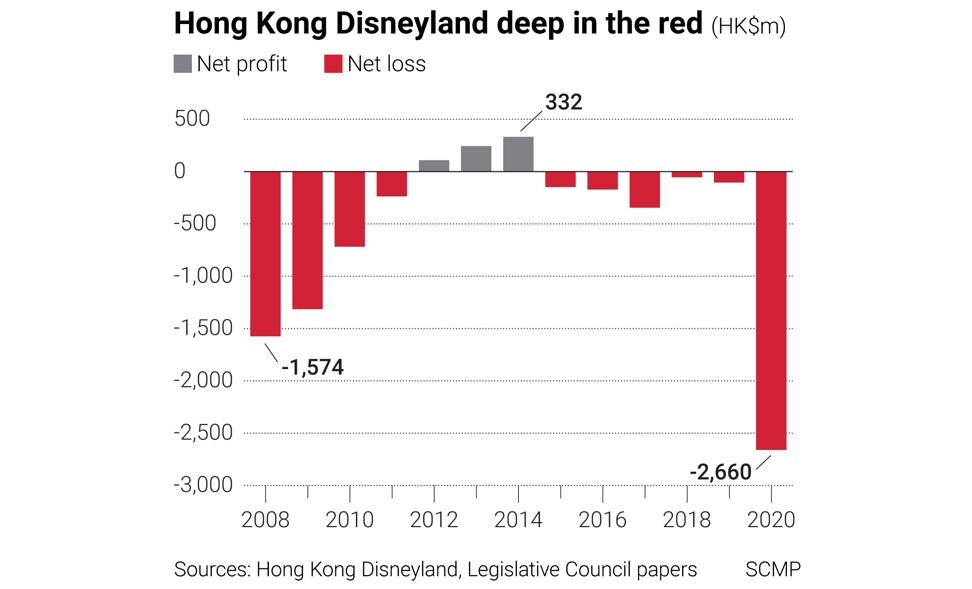
Hong Kong Disneyland has posted its worst net loss on record at HK$2.66 billion (US$347 million) – the park’s sixth straight year without a profit – amid a series of closures and a near-complete absence of tourists because of the coronavirus pandemic.
The loss for the financial year ending September 30, 2020, revealed by the company on Monday was far worse than the HK$105 million recorded for the prior 12 months.
The embattled resort was dealt a severe blow by waves of social-distancing regulations mandated by the government and Hong Kong’s effective lockdown from the outside world. During the financial year, it was closed about 60 per cent of the time, and only allowed to operate at limited capacity even when it was open.
Amid the closures, Disneyland’s revenue plunged 76 per cent to HK$1.4 billion. The loss before interest, taxes, depreciation and amortisation stood at HK$1.5 billion.

Hong Kong Disneyland managing director Michael Moriarty revealed that its parent company Walt Disney had provided a HK$2.1 billion revolving facility as working capital.
The resort is 53 per cent owned by the Hong Kong government, with the rest held by the United States’ Walt Disney Company via the joint-venture Hong Kong International Theme Parks.
Hong Kong Disneyland pins hopes on new attraction, local visitors to keep going
“Our financial numbers are a reflection of the nature and impact of the global pandemic and do not necessarily provide a meaningful reference for future potential,” Moriarty said.
The Lantau Island resort, which celebrated its 15th anniversary in 2020, had made a profit in just three years of its existence since 2005.
Park admissions slumped 73 per cent year on year to just 1.7 million visitors – primarily Hong Kong residents – from 6.5 million people. As much as 75 per cent of park visitors were from the local market during the 2019-20 financial year, compared with 41 per cent in the previous year.

All but three Hong Kong border checkpoints have been closed since February last year, and it remains uncertain when that will change.
The pandemic exacerbated an existing decline in the number of inbound tourists, which began to contract in the latter half of 2019 amid anti-government protests.
Asked whether the park would seek funding from the Hong Kong government, Moriarty said they had no such intentions.
Loss-making rival Ocean Park in Southern district secured HK$6.8 billion funding in March to stay afloat. Ocean Park’s deficit for the year ending June 30, 2020, was doubled to HK$1.17 billion from HK$588.1 million a year ago.
Can theme parks survive as they woo residents to make up for millions of missing visitors?
Despite the downturn, the Disneyland resort has pressed ahead with a HK$10.9 billion expansion drive that will continue through 2023. The flagship Castle of Magical Dreams was unveiled in November last year, and a new attraction based on the film Frozen is slated to open this year.
The resort has also implemented a number of cost-saving initiatives to preserve jobs such as unpaid leave for more than 7,000 staff members, and operating only five days a week, closing every Tuesday and Thursday, since its September 2020 reopening.
Moriarty stressed the company had no plans to lay off staff, which included more than 5,300 full-time employees and 1,800 part-time workers.
Tourism sector lawmaker Yiu Si-wing said Disneyland’s main challenge was to sustain its revenue stream by attracting locals while travel was still ground to a halt.
“As long as the park can stay open during the summer months, and Hong Kong’s infection numbers remain low, that could bring the venue a minimal level of revenue,” he said.
Yiu also noted the park first turned to its parent company for a loan to cover its operating costs rather than seeking government funding.
“It would be challenging to pass through the Legislative Council if Disneyland seeks loans or funding from the government at this stage,” he added.







